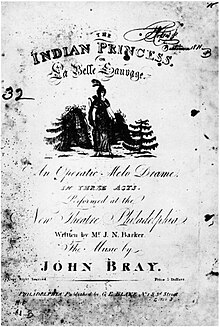The Indian Princess (play)
| The Indian Princess; or, La Belle Sauvage | |
|---|---|

Title page from original 1808 publication of score
|
|
| Written by | James Nelson Barker |
| Date premiered | April 6, 1808 |
| Place premiered | The Chestnut Street Theatre in Philadelphia |
| Original language | English |
The Indian Princess; or, La Belle Sauvage, is a musical play with a libretto by James Nelson Barker and music by John Bray, based on the Pocahontas story as originally recorded in John Smith's The Generall Historie of Virginia (1624). The piece is structured in the style of a Ballad-opera, with songs and choruses, and also has music underlying dialogue, like a melodrama. Pocahontas persuades her father, King Powhatan, to free Smith and becomes attracted to John Rolfe, breaking off her arranged marriage with a neighboring tribal prince, an action that leads to war. Her tribe wins the war, but her father loses trust in the white settlers; Pocahontas warns the settlers who reconcile with Powhatan. Several comic romances end happily, and Smith predicts a great future for the new country.
The play deals with relations between Native Americans and the first European settlers in America. Scholars have debated whether the piece is progressive in its depiction of the natives and have commented that the work reflects an emerging American dramatic and musical sensibility. It served to popularize and romanticize the Pocahontas story as an important American myth.
The comedy was first performed in 1808 at The Chestnut Street Theatre in Philadelphia. It has been cited as the first play about American Indians by an American playwright known to be produced on a professional stage, and possibly the first play produced in America to be then performed in England, although the validity of both statements has been questioned. Its portrayal of Native Americans has been criticized as racially insensitive, but the piece is credited with inspiring a whole new genre of plays about Pocahontas specifically and Native Americans in general, that was prevalent throughout the 19th and early 20th Century. The play was subsequently produced throughout the country.
Barker was motivated to create a truly "American" style of drama to counteract what he saw as "mental colonialism" and the American tendency to feel culturally inferior to Europe. For this reason, he looked to native subject matter for the play, as opposed to other American dramatists like John Howard Payne who neglected American subject matter and locations.
...
Wikipedia
